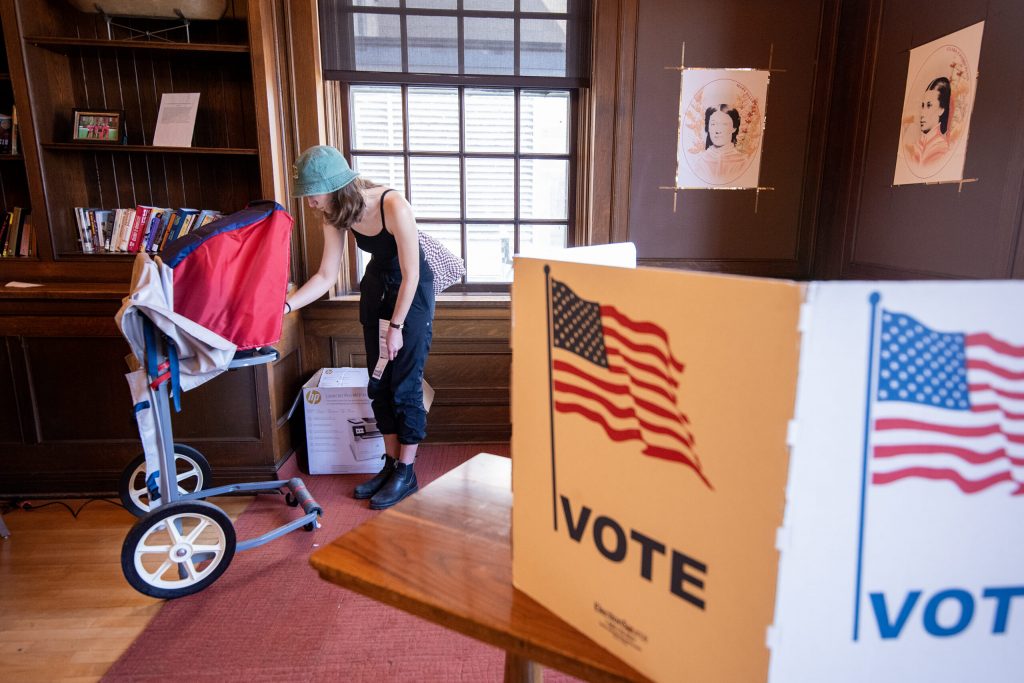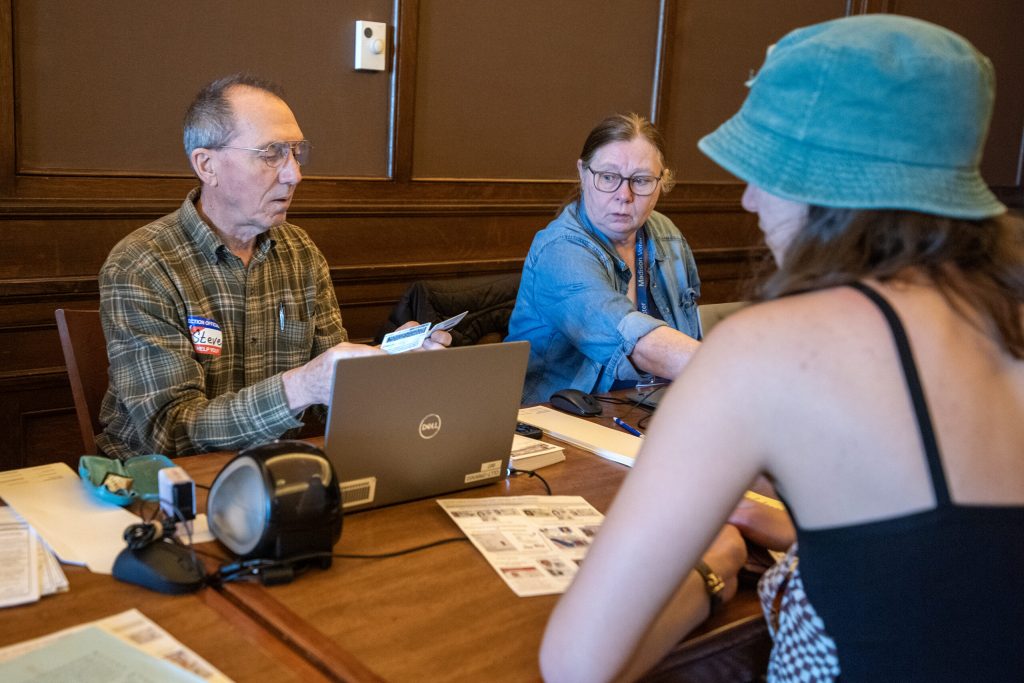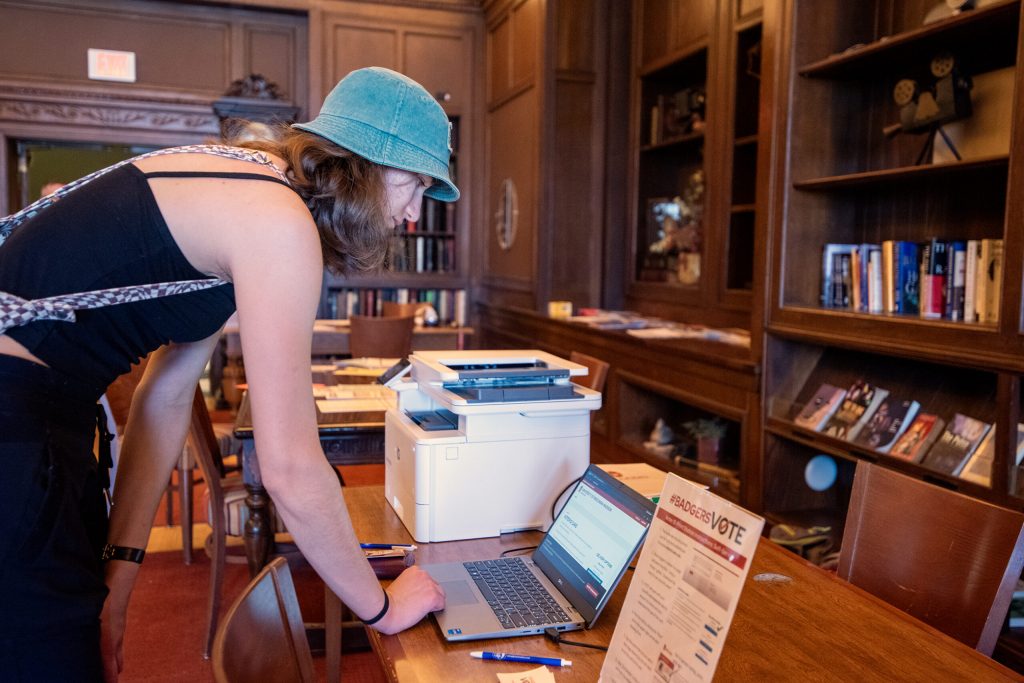Can You Use Student ID to Vote in Tuesday’s Election?
Yes, but it's complicated.

UW-Madison student Madeleine Afonso votes early in-person on campus Friday, March 28, 2025, in Madison, Wis. Angela Major/WPR
When it comes to voting in Wisconsin, the rules for college students can be a bit complicated.
For one thing, voters in Wisconsin are required to provide an acceptable form of photo identification, and that could include a student ID. But not every student ID is allowed.
That can create confusion, said Kirstin Hansen, the Wisconsin state coordinator for the Fair Elections Center, a voter advocacy group.
“It’s inconsistent,” she said in an interview with WPR. “(That’s) the biggest issue.”
What kinds of student ID can voters use?
In Wisconsin, election workers can accept multiple forms of photo ID. Among other options, that could include a Wisconsin driver’s license, a free state ID card or a passport.
But that comes with caveats.
The ID needs to have a signature and it needs to list an expiration date and an issuance date. That expiration date has to be no more than two years after the issuance date listed on the ID.
It’s alright if the ID is expired, as long as the student can provide a separate document proving they’re currently enrolled at the school.
At UW-Madison, a special student ID is needed for voting
As University of Wisconsin-Madison senior Madeleine Afonso discovered recently, those rules mean that not every student ID is accepted.
Afonso arrived at a Madison absentee voting location Friday, prepared to cast her ballot early in Wisconsin’s Supreme Court race, which could shift the court’s ideological balance.
Afonso came armed with her Washington driver’s license and her Wiscard.
UW-Madison gives out those red Wiscards to every student. They’re used for everything from accessing buildings to paying for snacks.
But Wiscards expire five years after they’re issued, meaning they’re not an acceptable form of voter ID.
At UW-Madison, students can request a different type of student ID specifically for voting.
Last year, UW-Madison issued 12,531 of those free, voter-compliant student IDs. It’s given out about 750 more so far in 2025, according to figures provide by the university last week.
UW-Madison is the state’s largest university with close to 37,000 undergrad students.

UW-Madison student Madeleine Afonso presents identification to vote early in-person Friday, March 28, 2025, in Madison, Wis. Angela Major/WPR
Afonso did get to vote on Friday after she printed out a voter-compliant student ID. Her on-campus voting location at the Memorial Union Terrace had a printer available specifically for that purpose.
Republican Gov. Scott Walker signed Wisconsin’s voter ID requirements into law in 2011, although those rules have since been revised and halted at times after legal challenges.
After Wisconsin’s voter ID rules took effect, officials at UW-Madison determined it would be “cost-prohibitive” to change the Wiscard so that it complies with voter ID requirements, said UW-Madison spokesperson Greg Bump.
“The university would need to ask all students to get new cards every 2 years, many of whom do not need to use their Wiscard as a voter ID,” Bump wrote in an email. “In addition, the Wiscard is quite expensive compared to the voter ID card, as it contains embedded technology to work as a debit card for purchases at dining halls and campus markets, as well as an access card to specific buildings for each student.”
Differences in student ID policies can confuse voters, advocates say
There’s more than 80 colleges and universities in Wisconsin, and each campus has their own student ID policies.
He says Wisconsin’s voter ID rules — like the requirement that student ID cards have a maximum two-year expiration date — create needless barriers for young voters.
“I think Republicans in the state Legislature have known for the past decade or more that students do not believe in their vision and that they do not agree with their policies,” Lehner said. “(They’ve) systematically tried to make sure that it is as difficult as possible for students to vote.”
Across Wisconsin and the country, college-age voters are more likely to be left-leaning. They’re also less likely to vote compared to older adults.
In Wisconsin, 49 percent of U.S. citizens between 18 and 24 years old turned out to vote in the 2022 midterm elections, according to the U.S. Census Bureau.
That’s lower than the statewide average in 2022, which was close to 61 percent voter turnout for all adult citizens.
The oldest cohort of Wisconsinites was the most likely to vote. Roughly 71 percent of those citizens ages 65 and older voted in that election, the census data shows.
Former state Rep. Jeff Stone and former state Sen. Joseph Leibham— two Republican sponsors of Wisconsin’s 2011 voter ID law — did not respond to questions from WPR about Wisconsin’s requirements for student IDs and voting.

UW-Madison student Madeleine Afonso prints out a student ID that can be used to vote Friday, March 28, 2025, in Madison, Wis. Angela Major/WPR
Virtual ID cards create hiccups for some students
At UW-Eau Claire, where Lehner studies political science, every student gets an ID called a BluGold card.
BluGold cards can be used as a voter ID — as long as the voter has a physical copy.
But a hiccup arose in the 2024 school year, when many students got virtual BluGold cards they could scan from their smartphones.
“We needed to make sure that students understood that they needed to actually request a physical Blugold ID card in order to vote on campus this election cycle,” Lehner said.
UW-Eau Claire does provide free physical ID cards to students who need them, and Lehner said college Democrats focused part of their outreach efforts on making sure students knew that.
“We saw no resistance from the Blugold card ID office,” Lehner said. “We were able to fulfill those requests, no problem. And we were fulfilling those requests on Election Day.”
Hansen, of the Fair Elections Center, says she hopes lawmakers will “tweak” Wisconsin’s voter ID law in the future so that virtual IDs are allowed.
Student ID policies vary widely across Wisconsin colleges, universities
More than half a dozen University of Wisconsin four-year schools and at least seven two-year UW schools issue a special student ID for voting because the regular student ID is not compliant, according to a guide updated by Common Cause Wisconsin in 2024.
That’s the case at UW-Milwaukee, where the regular student ID called the Panther Card cannot be used for voting. Last year, the campus provided 654 free voter-compliant IDs to students.
The situation is similar at Marquette University, a private Jesuit school in Milwaukee. Although Marquette’s regular student ID doesn’t meet requirements under Wisconsin’s voter ID law, the school gave out nearly 3,100 free Marquette voter IDs ahead of the November 2024 election, a university spokesperson said.
Would any of this change if Wisconsin voters approve Tuesday’s voter ID referendum?
Voter identification will be front and center in Wisconsin’s April 1 election, as voters weigh whether to approve a measure that would enshrine a voter ID mandate in the state constitution.
In some ways, nothing would change if that referendum passes. State law already requires voters to provide an acceptable form of photo ID.
But, compared to amending a state law, constitutional language would be harder for lawmakers to undo in the future. And it would protect voter ID rules from legal challenges.
Proponents say voter ID mandates increase confidence in elections.
Benjamin Rothove, who leads the UW-Madison College Republicans, says voter ID requirements help ensure election security.
“They are not a major barrier for anyone – including college students,” Rothove wrote in an email to WPR. “I expect that voters will overwhelmingly support enshrining voter ID in the Wisconsin Constitution.”
But critics, including the Fair Election Center and Wisconsin’s Democratic Party, point out that voter fraud is rare. They say voter ID rules are more likely to disenfranchise people who are less likely to have a valid ID — groups including college students, people of color and Wisconsinites with disabilities.
What other forms of ID can Wisconsin voters provide?
Along with an acceptable student ID, Wisconsin voters can show the following forms of photo ID:
- Wisconsin driver’s license
- Wisconsin non-driver ID
- Military ID card or an ID card from the Veteran’s Health Administration
- U.S. passport or a certificate of naturalization issued no more than two years before the election
- ID card from a federally recognized Indian tribe in Wisconsin
If voters show up on the polls on election day without an acceptable form of ID, they can cast a provisional ballot. After that, they have until 4 p.m. on the Friday after the election to show up at your local clerk’s office with the required identification.
What else should college students know about voting in Wisconsin?
If students are in Wisconsin for college, they have the option to vote here instead of their home state.
Wisconsin also has same-day voter registration. That means someone can register up until the time polls close at 8 p.m. on April 1. Proof of address is needed to register.
Can you use a student ID to vote in Wisconsin? Yes, but it’s complicated. was originally published by Wisconsin Public Radio.
If you think stories like this are important, become a member of Urban Milwaukee and help support real, independent journalism. Plus you get some cool added benefits.



















Do Republicans ever consider that restrictive voting laws could also keep persons who wanted to vote for Republican candidates from voting?
Yes they know that, and they don’t care. They just know it will hurt Democrats more than Republicans.